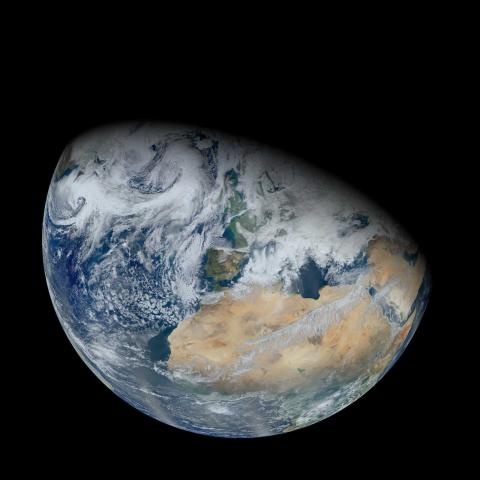
France is not doing well.
The crisis is evident from the ubiquitous beggars in the streets of Paris to its bad, and worsening, economic data. President Hollande's wishful notion of a merely temporary French lapse in the economic competition with Germany has ended; defeat has been conceded.
Northern Europe's heavy dose of austerity medicine has been rejected, and France has now joined the southern European chorus on the need for further deficit spending to revive the economy. Does that mean France — the continent's second-biggest and the world's fifth-biggest economy — is tilting towards Europe's informal 'Club Méditerranée', where life is sweet but subsidised by the more industrious north? Yes and no.
Yes, with regard to the outsize role that state intervention has in economic recovery. While it is undisputed internationally that the main fiscal parameters are the state's prerogative, the same is not true for the labour market, where France is hopelessly interventionist, thus stifling enterprise and innovation. This has proven difficult to change, as the key word in labour relations remains 'solidarité', leading to absurd situations where strikes are called not to change a particular group's grievances but rather out of solidarity with an unconnected economic segment. On the other side of the labour market, state incentives for employers are pocketed rather than reinvested to create new employment.
No, in that it does not share the quasi-feudal conditions that can still be found in much of southern Europe, where a few families and clans are spread over considerable parts of the economy of Italy, Spain and especially Greece and Portugal. The recent implosion of the latter's banking and real estate conglomerate Espirito Santo illustrates the ongoing struggle to get rid of these deeply encrusted structures.
France, of course, had its seminal break with feudalism and religion long ago. As the French school books have it, France's Age of Enlightenment, followed by the mother of all social revolutions, catapulted the country to the forefront of humanity's struggle to provide just, decent and equal living conditions for all and every 'citoyen'. [fold]
Whatever the historical truth of this narrative, it is a fact that the French 'contrat social', especially its educational side, provides for a basically level playing field. Public schools are just that and, mostly, they are the best. Universities are state institutions too, not private for-profit enterprises. They charge nominal fees and are not burdening the average new labour market entrant with crippling student loans to be paid back before starting professional life.
Certainly these structures have aged badly and are fraying at the edges. The main problem here, as in other sectors, is an unwillingness to innovate as both the composition of society (through immigration, especially from non-European countries) and academic content (globalisation; digitalisation) change beyond recognition. Yet the system is basically sound and can be renovated, as long as the assumption prevails that education is as much a public good, gained by merit and not (daddy's) money, as it is an individual investment in one's own future.
Excellent food is still the delight of anybody living in or visiting France. Yet food (or rather its provider, agriculture) constitutes a major hurdle for economic development in France. What commodities are for Australia, agriculture is for France, yet for far too long, this economic sector has attracted a disproportionate share of capital, labour and subsidies (both nationally and through the EU's Common Agricultural Policy). Due to migration, cheaper imports and technological advances, jobs in French agriculture are today at the bottom rung of the economic scale and vanishing rapidly.
Yet labour and capital, thus freed up, has not been channeled into innovative industrial production, itself hard hit by globalisation with its export of capacities to emerging countries. Thus the schism between a relatively small elite profiting disproportionally from globalisation and the army of globalisation losers is even more pronounced in France than in other Western countries. This in turn is not exactly conducive to labour market reforms.
While the lack of economic reform remains a major drag on the country and on its role in Europe, the opposite is true with regard to two other major elements of potential progress towards the 'great European promise', as symbolised by the EU.
Firstly, Europe will have to develop the means to guarantee order in its 'near abroad' (Mediterranean, Africa) and to take a bigger part of responsibility for a functioning global order. As we all know, the US is unwilling and unable to continue to shoulder the burden on its own. It is fair and necessary that Europe should help, and here France has been a leader, especially with regard to Africa.
The second area where France counts among the leading countries in Europe concerns assimilation of immigrants, especially those with non-European roots. The ugly historical chapters of racism in its colonies and of rampant antisemitism notwithstanding, 'la nation fondatrice des droits de l'homme' nevertheless has a pretty good record over the last 50 years of integrating the huge influx of immigrants from former colonies. The remaining challenge from mainly Muslim 'banlieus' (suburbs) and the present political onslaught from the xenophobic far-right have economic rather than social roots. They can be solved when the aforementioned economic reforms are tackled in earnest.
On a personal level, the French are in general quite tolerant, and this not only with regard to their womanising politicians. France's leading Sunday paper Journal de Dimanche runs a yearly contest to crown the most popular person nationwide. In this country of said politicians, charming crooners, attractive actresses and great chefs, the crown this year did not go to any of these, but rather to singer-songwriter Jean-Jacques Goldman, son of a Polish Jew and a German, followed by two actors, one with African ancestry and the other with Algerian background.
Photo by Flickr user jacsonquerubin.
